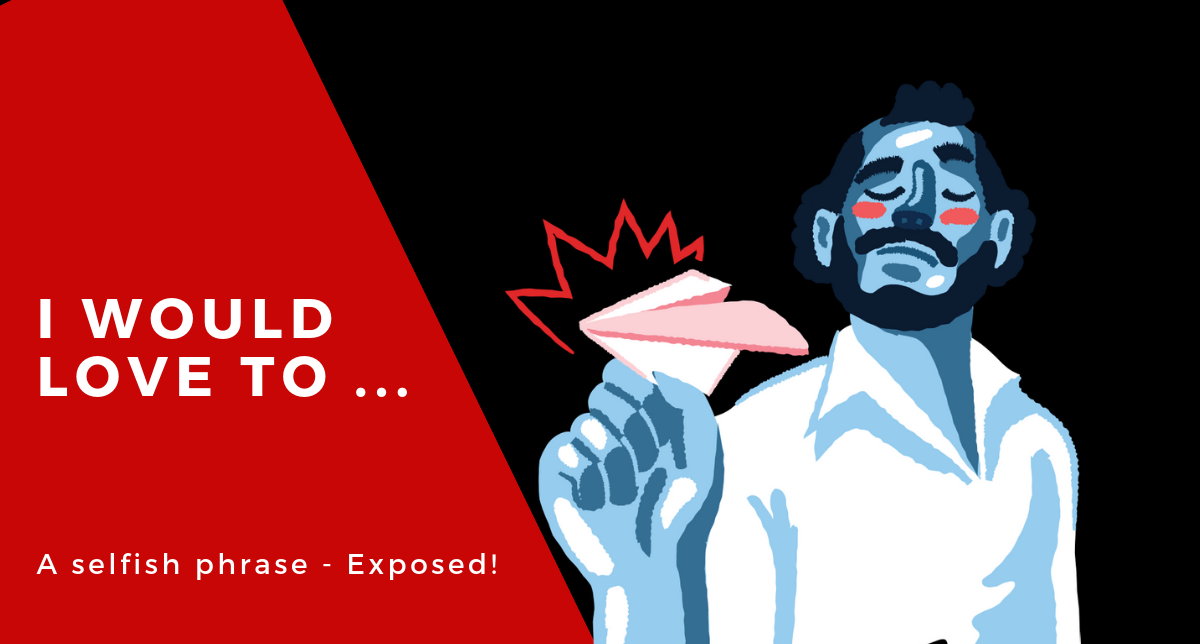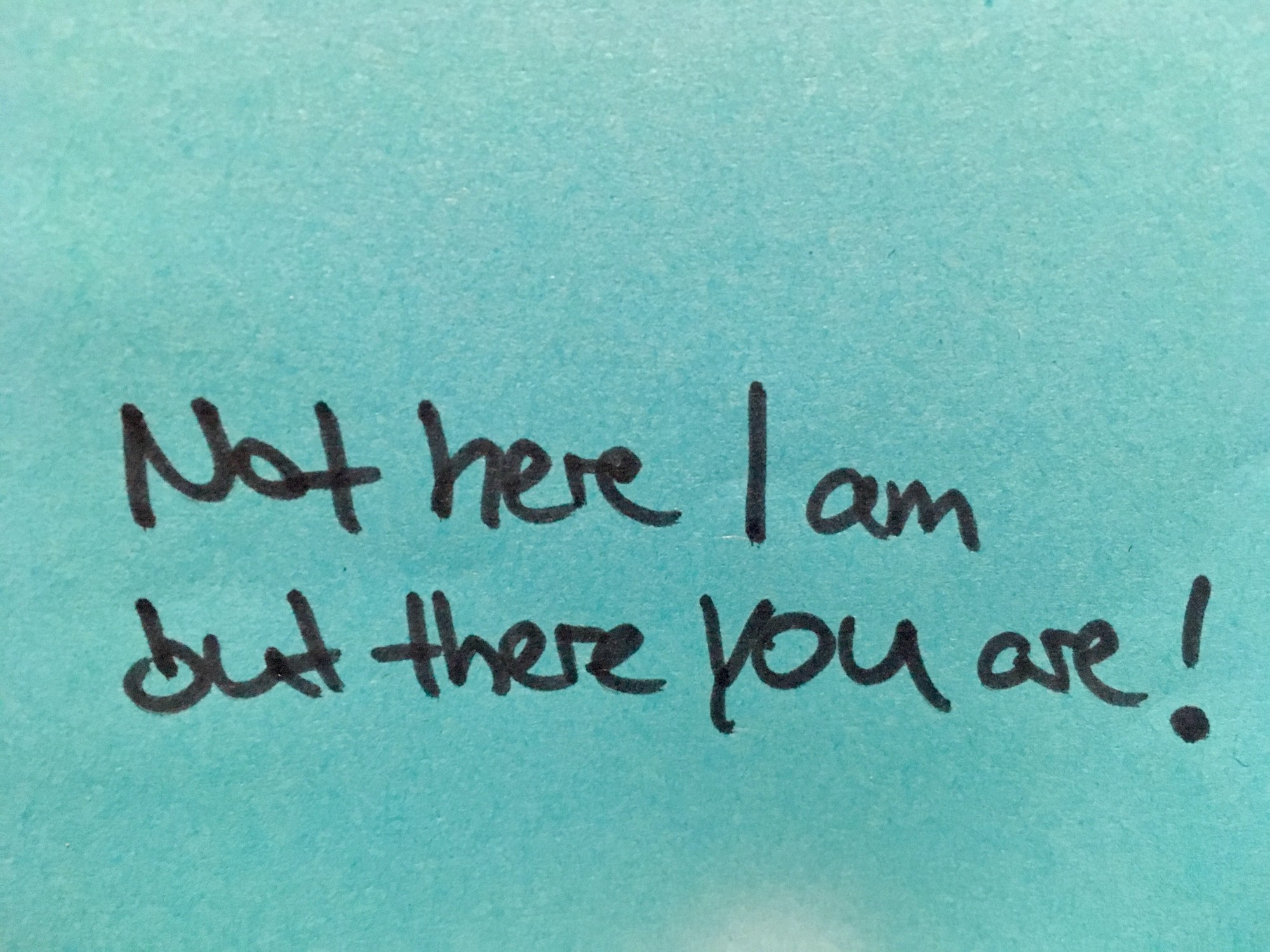 Illustration from https://icons8.com
Illustration from https://icons8.com
How often have you read the following in an email or in a LinkedIn request? (Full disclosure: I am guilty of it, too).
Hey, {input first name},
{start with a genuine compliment}. I would love to ?
? connect and have a conversation about {topic name drop}
? learn more about this problem you?re facing.
? pick your brain on a project I am working on.
? have a chat at this event tomorrow night.
? give you a quick demo of our product.
?
Cheers
{Your name}
Sending message ? Yeah, what a personalised invitation, right? I?ll save it as a template and re-use it on LinkedIn, my product feedback email, my sales script, ?
This is what the recipient of your message might have thought. ?

What?s the problem with this phrase?I would love to ???
?I would love to ?? is about YOU. It?s about what YOU want. It?s neither about the other persons? interests nor about their context. It?s a selfish plastic phrase. Replace the word ?love? with ?like?. Read it again. The magic is already fading. For the recipient, an inner voice is triggered whispering: What?s in it for me? How do I get value from this? How could that statement be real?
?I would love to ?? is a selfish phrase.
The more you?re exposed to these idioms, the less meaningful they become. It?s another yet another wave of startup slang, cultivated in the valley, spread across the globe as best practice and now unmasked as a meaningless cliche. Chit-Chat. As if you try to compensate for a lack of specificity in your messaging. ?You would love to demo your product at a time that works for you? reads ? meh.
Think about it: How genuine does it feel to receive the ?I would love to ?? phrase from a person you?ve never met before. It?s like the ?Will you marry me?? question on the first date. Kinda misplaced.

How did I come across it?
I?ve read it a 100x times and applied it myself. My thoughts? It?s a lightweight and strong piece to express a genuine interest in doing something with/for the receiving person. It seemed like best practice. Alli McKee picked up this issue in her LinkedIn video, referencing a post by Jeremy Leville on the ?I would love to?-trap.
Speaking of best practices: I am reading over these and similar milked to death best-practices like ?PS ? Here?s my exclusive bonus tip for you: I am hosting a mastermind where I would love to share all the tactics on how we?ve 10X our {input arbitrary metric} in just {input arbitrary time unit}?. Sure, there are principles on how to master persuasion. Scarcity and exclusivity are two ingredients of that recipe (re-visit the classic: Cialdinis? 6 principles of influence). But you cannot outperform your competitors by following best practices.
You cannot outperform your competitors by following best practices.
5 Alternatives you can start using today
Don?t just copy and paste suggestions. Build on top of them. Spice them up. Make them your own ? for the sake of the recipient.

The guiding principle: Make it about them, not about you. In other (more elegant) words: Not here I am but there you are. Demonstrate your enthusiasm by communicating at the intersection of value and relevance. What if you?re new to something? Be open about it and convince others with genuine interest. Experienced people *love to* share their advice and thoughts if you ask for it, especially if they can relate to your situation.
- I would welcome the chance/opportunity to learn more about {put in the specifics} and {offer desired outcome}. For example: ?I would welcome the opportunity to learn more about your challenges in closing deals. Happy to demonstrate our formula on how we?ve cut our call time by 50% but increased our closing rate by 50%.?
- I am new to the {input field of interest} and wanted to ask for your recommendations to books, articles, podcasts or other resources on {input specifics of that field of interest}.
- Would you be up for a conversation about the presentation of {input speaker}? I am sharing his/her passion on that topic and seeking the advice of other industry professionals in {input specific area of interest}
- May I demonstrate how {input your brand name/product} can simplify your {input specific area of improvement} by saving {input arbitrary number} of your {input resource of interest}. For example: ?May I demonstrate how WouldLove can simplify your recruiting process by saving 30% of your time distributing job postings?.? Well, that still sounds like a catch it all plastic sentence, right? Spice it up with more specificity: ?May I demonstrate how LoveCorp can simplify your recruiting process by managing all your job postings in one place so you can spend 30% more time engaging with your future co-workers??
- (What if you start with a question?) What metrics do you care most about in {input product vertical} and what would we have to accomplish to get your attention?
What?s next?
I can see this growing into a library of ?would love to? alternatives categorised by message intend like ask for feedback, seek advice, schedule a demo, ? . I am sure there are lot?s of hot stories about out there. Would you share them with us?
?What are your favourite strategies, phrases or words for a YOU-centred message? ?


